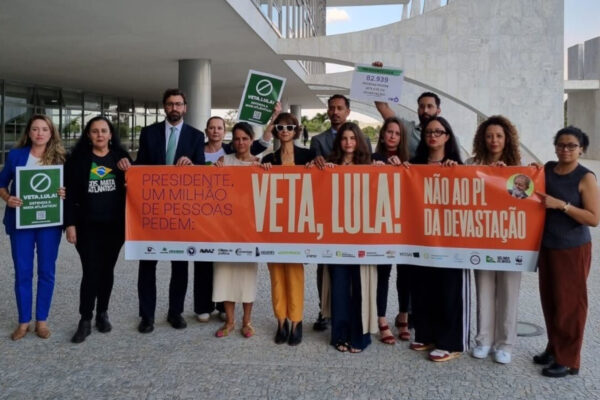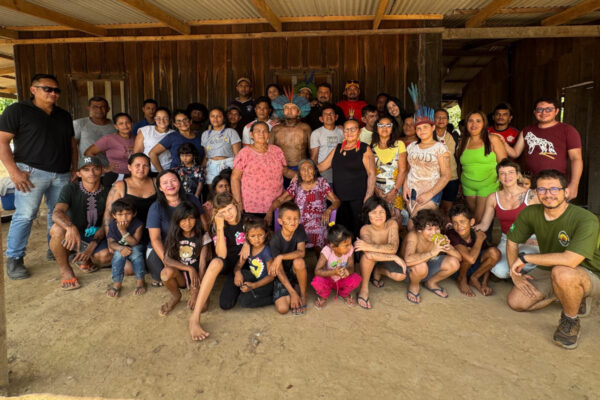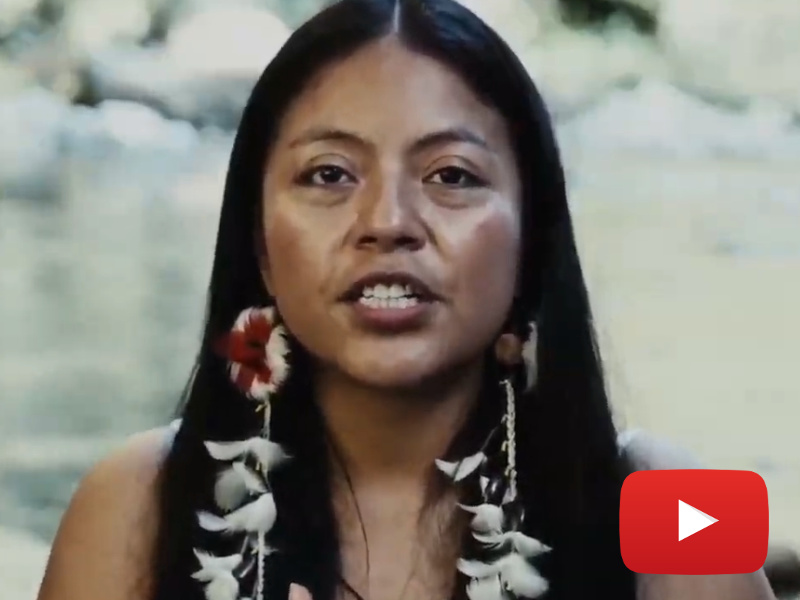Oil companies have encountered some tough opponents and have suffered their share of black eyes. But never have they come up against a dilemma like the one Occidental Petroleum of Los Angeles faces in the wilds of Colombia.
A semi-nomadic tribe called the U’wa, 5,000 strong, is making the ultimate threat – to commit mass suicide by leaping from a cliff – in an attempt to prevent Oxy from drilling for oil in what the tribe claims is U’wa territory.
A public-relations mess at best, and a prospective human tragedy, the dispute will be aired starting today at the company’s annual shareholder meeting in Santa Monica and continuing over the next few weeks as the tribe’s visiting chief escorted by environmental groups – conducts a U.S. lobbying blitz.
“This oil belongs to the land, it’s part of it and it can’t be taken out,” U’wa Council Chief Roberto Cobaria said. Oxy, which has approval from the Colombian government to proceed with exploratory drilling, is looking to government leaders to mediate an accord.
How serious is the threat? It could, of course, be a publicity stunt the result of what Oxy claims is intimidation of the U’wa by guerrillas. Legend has it that a group of U’wa tribe members led by Chief Guaiticu committed mass suicide in the 17th century in a protest against Spanish colonialism. But historians and anthropologists – including one hired by Oxy – say there is no historical record of such an event.
Then again, does Oxy want to risk it?
Occidental is already a big player in Colombia, where its Cano Limon oil field produces 180,000 barrels of oil a day. But that oil field, which vaulted the nation to energy self- sufficiency in the 1980s, is slowly being depleted and Oxy needs the disputed Samore field to replace it. To gain access, the company indicates that it is willing to endorse sweeter oil royalties for indigenous Colombians such as the U’wa.
Also eager for a settlement is the Colombian government, which sides with Oxy. The government has watched oil exploration by foreign companies dwindle because of the harsh political climate – guerrilla wars and narco-terrorism are prime examples – and wants to show foreign companies that it exercises some measure of control.
The U’wa tribe members seem to have exhausted their legal claim to the land, which lies outside their reservation but which they maintain is theirs because it lies in their migratory path.
After being bounced back and forth in the Colombian courts, the issue was decided in Oxy’s favor by an administrative law court ruling last month. Moreover, the Colombian government claims all mineral rights in Colombia. But the U’wa tribe has garnered considerable popular support in Colombia, where a significant portion of the body politic views foreign oil companies as beneath contempt, out to leech the country of profits and lay waste to surrounding people and terrain.
“How would you feel if I came and exploited your territory?” Cobaria asked in a telephone interview from Bogota. So in a rare gesture of conciliation, three Colombian Cabinet ministers the heads of mining and energy, environment and the interior – announced this week that they will travel in late May to the U’wa reservation near the Oxy field east of the Andes Mountains in hopes of reaching an agreement.
But the government seems to regard the matter as decided. The visit’s purpose is to persuade the U’wa tribe not to feel “offended or ill-treated . . . and that all the legal steps have been taken” preceding Oxy’s drilling, said Energy and Mining Ministry spokesman Juan Carlos Aya.
Oxy is awaiting some sign that the government and the U’wa tribe have reached an accord before proceeding. The company, which so far has invested $ 12 million in the site, says it could lose the drilling rights if it refuses to proceed after getting a green light from the government.
But the U’wa tribe says its opposition is not negotiable. Its members are staunchly opposed to any drilling on their lands in the llanos, or plains region, on the rim of the Amazon basin.
They say the extraction of petroleum would harm their culture and beliefs, even cause their physical world to implode.
Indigenous peoples also point to the fate of tribes in other parts of Colombia and throughout South America on whose land drilling has gone forward, costing them farming, hunting and fishing grounds that provide their subsistence.
For those reasons, Hector Mondragon, an U’wa advisor affiliated with the Colombian National Indigenous Organization, a league of 80 native peoples, said the U’wa are prepared to throw themselves from a cliff, just as their ancestors did in the 1600s, if Oxy prevails.
“If Occidental succeeds in exploiting the land, then a mass suicide will happen again,” Mondragon said. But Oxy officials – while endorsing a settlement that would give indigenous peoples a bigger share of the oil royalties paid to Colombia say the reasons behind the opposition are less noble than that.
A top Occidental executive insists that Colombian rebel groups the ones who have blown up its Cano Limon pipeline more than 460 times since 1985 put the U’wa up to making the threats.
The U’wa signed off on oil exploration in Samore in 1993, only to change their minds later, a sign of guerrilla intimidation, Oxy Vice President Lawrence P. Meriage said Thursday. Occidental has consistently refused to pay guerrillas not to attack its pipeline, hence the hundreds of bombings.
The lack of any historical record of such a suicide leads Oxy to describe the suicide threat itself as a tool designed to make the issue a cause celebre among environmental and human rights groups. And it has worked: Oxy said it has been deluged with letters, faxes and electronic mail from the world over, urging it to abandon Samore.
Jane Rausch, a University of Massachusetts history professor who wrote a book about the Colombian llanos and who has worked there since 1964, said she has never heard of the purported mass suicide. “It could have happened, but I sure don’t know about it,” said Rausch. Nor does David Bushnell, a retired University of Florida history professor who wrote the only English language general history of Colombia.
Harvard history professor Ted Macdonald, who was commissioned by Occidental to research the reported suicide, searched missionary records and writings of a U’wa ethnographer, the late British researcher Ann Osborn, but found “no mention of what is, or certainly should be, a major event – a collective suicide,” his report to Oxy said.
Complicating the issue for Oxy is the vague language of the Colombian Constitution, which was rewritten in 1991 to give indigenous peoples consultative rights over oil and mining exploitation of nearby territory. Native peoples have wrongly construed this to mean veto power, said Alejandro Martinez, president of the Colombian Petroleum Assn., a trade group of foreign oil companies. The administrative court decision last month supported the oil companies’ interpretation.
That should have given Oxy the green light for drilling in the area, about 400,000 acres that lie conveniently astride the 483-mile pipeline that Oxy completed in 1985. But the company sees a public-relations nightmare in the making. The threat has galvanized an international coalition of environmentalists, including several U.S. groups, to trumpet the U’wa cause on the Internet.
Several are sponsoring Cobaria’s visit to Washington, New York and Los Angeles starting next week. Today’s annual meeting is expected to attract dozens of demonstrators.
“We’re supporting the U’wa in their demands that Occidental promise to respect their cultural integrity and not drill for oil on their ancestral land. We need to hold U.S. corporations accountable for their actions,” said Lucy Braham, member of Action Resource Center of Los Angeles, the group that along with Amazon Watch of Malibu is hosting Cobaria’s visit to Los Angeles on May 2.













